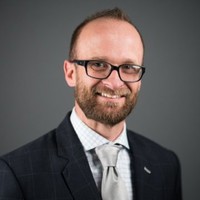
Benjamin C. Jenkins
- Courses1
- Reviews1
- School: Western New Mexico University
- Campus:
- Department: Health Science
- Email address: Join to see
- Phone: Join to see
-
Location:
1000 W College Ave
Silver City, NM - 80061 - Dates at Western New Mexico University: March 2017 - March 2017
- Office Hours: Join to see
Biography
Benjamin C Jenkins is a/an Lecturer in the California State University department at California State University
Western New Mexico University - Health Science
Program Director/Assistant Professor at Western New Mexico University | Forensic/Vocational Expert
Benjamin C.
Jenkins, PhD, CRC
Silver City, New Mexico
Rehabilitation expert since 2009. Experience and expertise in all facets of rehabilitation including: forensics; higher education; research; counseling; evaluation; case management; and integrated care in public and private settings. Current research focus is on individuals and families in the experience of disability.
Specialties: Research; instruction; evaluation of potential for successful rehabilitation considering age, education, work skills and functional capacity; development of rehabilitation plans based on individual aptitudes, education levels, physical abilities, job skills and career goals; identification of transferable skills to determine vocational options and earning capacity; counseling individuals to develop and achieve job goals; providing job placement assistance and post-placement follow up; development of community resources in rural regions.
Experience
Education
Utah State University
Masters of Science
Rehabilitation Counseling
The University of Texas-Pan American
Doctor of Philosophy (Ph.D.)
Rehabilitation Counseling
The Ph.D. in Rehabilitation Counseling offered by the Department of Rehabilitation is designed primarily to prepare students to become rehabilitation educators, researchers and administrators, and additionally offers the academic preparation to become certified as rehabilitation counselors. The degree focuses on advanced training in counseling specializing in working with people with disabilities and involves approximately two years of full time coursework plus a dissertation.The University of Texas-Pan American
Research Assistant
Assist in academic research in the areas of program evaluation, substance abuse, addictive behaviors, and persons with disabilities.The University of Texas-Pan American
Instructor
Post secondary educator in undergraduate and graduate rehabilitation counseling program at the second largest predominantly hispanic-serving institution (HSI) in the nation. Courses taught included: Case management (REHS 3303); Families and Disability (REHS 3320); Internship in Rehabilitation (REHS 7600); Intro to Addictions (REHS 2321); Introduction to Rehabilitation Counseling (Online; REHS 2301); Medical Terminology (HRP 2303); Research Methods (REHS 4310 & 6315).
Publications
Comunicación sexual: diferencias entre padres de hijos con y sin discapacidad - Sexual communication: Differences between parents of children with and without disability.
Psicología y Salud, Vol. 28, Núm. 1: 5-13, enero-junio de 2018
The aim of the present study was to compare the sociodemographic characteristics, level of knowledge, beliefs, stereotypes, expectations, and sexual communication between parents of disa- bled and non-disabled children. Participants consisted of 152 parents with an average age of 54 with teenage children assigned to two groups: parents of disabled children (PDC) and parents of non-disabled children (PNC). Results show that PDCs have more stereotypes and communicate less with their children than PNCs. These findings are discussed in terms of the implications for promo- ting sexual health of persons with disabilities. Key words: Adolescents; Disability; Parents; Communication; Sexuality.
Comunicación sexual: diferencias entre padres de hijos con y sin discapacidad - Sexual communication: Differences between parents of children with and without disability.
Psicología y Salud, Vol. 28, Núm. 1: 5-13, enero-junio de 2018
The aim of the present study was to compare the sociodemographic characteristics, level of knowledge, beliefs, stereotypes, expectations, and sexual communication between parents of disa- bled and non-disabled children. Participants consisted of 152 parents with an average age of 54 with teenage children assigned to two groups: parents of disabled children (PDC) and parents of non-disabled children (PNC). Results show that PDCs have more stereotypes and communicate less with their children than PNCs. These findings are discussed in terms of the implications for promo- ting sexual health of persons with disabilities. Key words: Adolescents; Disability; Parents; Communication; Sexuality.
Actitudes y estereotipos en estudiantes del área de la salud hacia personas con discapacidad motriz - Attitudes and stereotypes in students of the health area towards people with motor disabilities
Revista Española de Discapacidad, 6 (I): 199-219.
The main purpose of this research was to analyze the attitudes and stereotypes towards people with motor disabilities in a sample of students from the health area. To this end, the Multidimensional Scale of Attitudes towards Persons with Disabilities and an instru-ment for measuring stereotypes (warmth and competence) towards people with disa-bilities. We worked with 232 students (average age: 23 years old, SD = 5) to whom the online instruments were applied. The results of the factor analysis show a theoretically congruent structure and adequate psychometric properties for both instruments. Partici-pants reported positive attitudes towards people with disabilities and similar perceptions of competence towards individuals with and without disabilities. However, they reported significantly higher levels of warmth for people with disabilities. These results suggest a low disposition to report stereotypes of incompetence or dislike towards people with disabilities, but a compensatory perception of greater warmth.
Comunicación sexual: diferencias entre padres de hijos con y sin discapacidad - Sexual communication: Differences between parents of children with and without disability.
Psicología y Salud, Vol. 28, Núm. 1: 5-13, enero-junio de 2018
The aim of the present study was to compare the sociodemographic characteristics, level of knowledge, beliefs, stereotypes, expectations, and sexual communication between parents of disa- bled and non-disabled children. Participants consisted of 152 parents with an average age of 54 with teenage children assigned to two groups: parents of disabled children (PDC) and parents of non-disabled children (PNC). Results show that PDCs have more stereotypes and communicate less with their children than PNCs. These findings are discussed in terms of the implications for promo- ting sexual health of persons with disabilities. Key words: Adolescents; Disability; Parents; Communication; Sexuality.
Actitudes y estereotipos en estudiantes del área de la salud hacia personas con discapacidad motriz - Attitudes and stereotypes in students of the health area towards people with motor disabilities
Revista Española de Discapacidad, 6 (I): 199-219.
The main purpose of this research was to analyze the attitudes and stereotypes towards people with motor disabilities in a sample of students from the health area. To this end, the Multidimensional Scale of Attitudes towards Persons with Disabilities and an instru-ment for measuring stereotypes (warmth and competence) towards people with disa-bilities. We worked with 232 students (average age: 23 years old, SD = 5) to whom the online instruments were applied. The results of the factor analysis show a theoretically congruent structure and adequate psychometric properties for both instruments. Partici-pants reported positive attitudes towards people with disabilities and similar perceptions of competence towards individuals with and without disabilities. However, they reported significantly higher levels of warmth for people with disabilities. These results suggest a low disposition to report stereotypes of incompetence or dislike towards people with disabilities, but a compensatory perception of greater warmth.
Finding the Family in Rehabilitation Counseling.
Springer Publishing Company
Defining the family presence in rehabilitation counseling has been a perennial issue— often engaged, but never fully resolved. Family members have been recognized for their influence on rehabilitation process and outcomes (Sutton, 1985; Westin & Reiss, 1979). Academics have argued the potential role of family therapy models within rehabilitation counseling (Millington, 2012; Power & Dell Orto, 2004). Family experience with service has been explored from a systems perspective (Cottone, 2012). Ecological models have been employed to justify families as partners in service and as service recipients (Kelley & Lambert, 1992; Power, Hershenson, & Fabian, 1991). The specialized knowledge of family counseling has become part of the qualified rehabilitation counselor identity (Leahy, 2012). Despite these advances, the family discourse has not translated into a sustained movement in research (Bryan, 2009), practice (Frain, Berven, Chan, & Tschopp, 2008; Freedman & Fesko, 1996), training (Riemer-Reiss & Morrissette, 2002), or policy (Kneipp & Bender, 1981).
